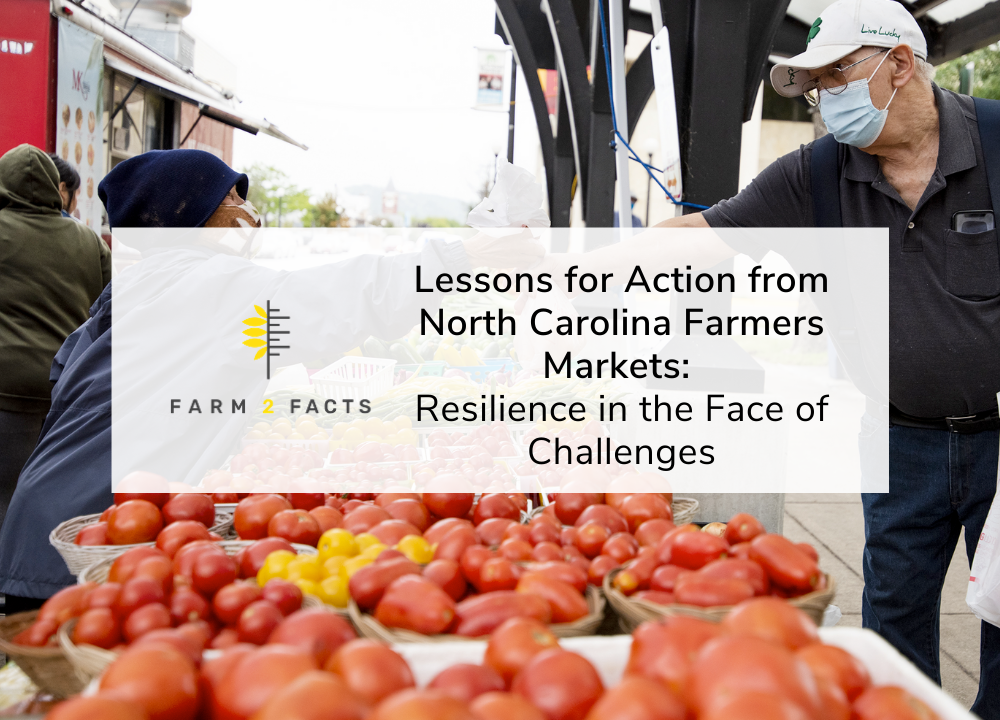
The COVID-19 pandemic has taught us a lot about the strengths and weaknesses of our food systems – and it has shown us the true power of farmers markets.
When the virus hit in early 2020, mainstream food supply chains struggled to adapt. Grocery stores ran low or ran out of food, restaurants shut their doors, farmers were forced to discard products they couldn’t move to market. As people watched this breakdown, many turned to local farms for food – both an act of community support for local farmers and an acknowledgement that buying local offers something truly unique and, perhaps, underappreciated: resilience.
Farmers markets – important hubs for people looking to buy locally – stepped up to fill key roles for their communities in the face of COVID-19. Their success in overcoming catastrophic challenges can teach important lessons about what resilience looks like in practice, and how markets can plan for future resilience.
In summer 2020, Community Food Lab, a North Carolina-based food system design consultancy, surveyed farmers markets around North Carolina. They aimed to learn about how farmers markets responded to COVID-19 and share successes, lessons, and actionable recommendations with farmers markets who are looking to build resilience and impact. They also sought to learn about how farmers markets were responding to resounding societal mandates for racial equity and justice.
The survey captured responses from 78 farmers markets in North Carolina, representing ~45% of the state’s farmers markets. The survey report, authored by Mara Lowry and Erin White of Community Food Lab, highlighted that 55% of reporting markets estimated higher sales in 2020 compared to 2019. The upshot? Many markets have engaged in key actions to strengthen their success, impact, resilience, and racial equity – even during the COVID-19 pandemic.
Based on these key actions, the findings coalesced around three primary themes and specific, actionable recommendations for farmers markets looking to increase their resilience and racial equity:
- Learn from COVID-19 for resilient markets
- Invest in curbside pickup, online ordering, and email mailing list initiatives
- Right size your market to your nearby population
- Support increases in dedicated farmers market staffing for vendor retention
- Learn from COVID-19 for a resilient system
- Grow market partnerships with local governments, organizations, and networks to share resources
- Explore virtual food hub platforms where innovative marketing links vendors and customers
- Develop and fund a dedicated statewide farmers market database, network, and resource platform
- Work with BIPOC communities to build racial equity
- Begin a conversation about race in your market
- Increase representation of BIPOC (Black, Indigenous, and People of Color) among market leadership and vendors
- Critically examine your market’s structure and policies, focusing on equity and inclusion
- Provide support to markets for racial equity trainings, education materials, and conversations
Further details on how to put these recommendations into action can be found in the report.
While every farmers market can certainly improve, the pandemic has shown us that farmers markets already support our communities through times of crisis. They nimbly adapt to meet demand for fresh, healthy produce. They restore people’s sense of connection with their local farmers, food systems, and communities. They strengthen community resilience and our ability to thrive in the face of adversity. To all of those involved in keeping farmers markets running in our communities, thank you!
CLICK HERE to read the info-packed report by Community Food Lab, called Crisis, Opportunity, & Resilience in NC’s Local Food System: A 2020 NC Farmers Market Survey & Action Proposal.
January 21, 2021
By Catie DeMets
